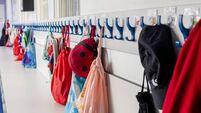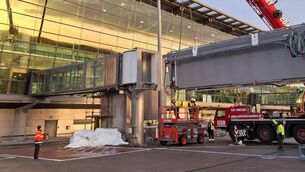Cardiac staff at Cork hospital receive surgical training on back of articulated truck

Intern, Dr Orna Cantillon; candidate advanced nurse practitioner in cardiothoracic surgery, Clodagh Downey; and clinical lead/consultant cardiothoracic surgeon Dr Kishore Doddakula at a workshop in the mobile training truck. Animal hearts which are anatomically like human hearts were used. Pictures: Jim Coughlan
Cardiac surgeons worked on cutting-edge heart surgery techniques in the back of a truck in what was a surgical training first for one of the country’s largest teaching hospitals.
The surgeons at Cork University Hospital (CUH) attended workshops and then practiced several cardiac surgery procedures, some using minimally invasive techniques, in the specially equipped high-tech Medtronic mobile training truck which parked on the hospital campus yesterday.













